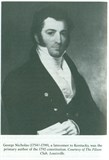
Nullification 101: George Nicholas at the Virginia Ratifying Convention
“Mr. NICHOLAS contended that the language of the proposed ratification would secure every thing which gentlemen desired, as it declared that all powers vested in the Edition: current; Page: [626] Constitution were derived from the people, and might be resumed by them whensoever they should be perverted to their injury and oppression; and that every power not granted thereby remained at their will. No danger whatever could arise; for, says he, these expressions will become a part of the contract. The Constitution cannot be binding on Virginia, but with these conditions. If thirteen individuals are about to make a contract, and one agrees to it, but at the same time declares that he understands its meaning, signification, and intent, to be, (what the words of the contract plainly and obviously denote,) that it is not to be construed so as to impose any supplementary condition upon him, and that he is to be exonerated from it whensoever any such imposition shall be attempted, — I ask whether, in this case, these conditions, on which he has assented to it, would not be binding on the other twelve. In like manner these conditions will be binding on Congress. They can exercise no power that is not expressly granted them.”
A lot of people look to Thomas Jefferson or James Madison to understand nullification, but there’s also George Nicholas.
Early in the Virginia ratifying convention, approval of the Constitution was in doubt. Many delegates were concerned that the federal government would eventually take on additional, unwarranted powers. Leading historians say the turning point in the convention was a speech by George Nicholas.
He told the delegates to think of the legal basis of the Constitution like a contract entered into by 13 individuals. He then asked a rhetorical question. If one party agrees to the contract, but only under two conditions:
1) that it would never be construed to impose any additional requirements; and
2) any attempt to do so would be a violation of the contract
And if everyone agreed to those two conditions, wouldn’t they be legally binding on all parties?
The answer is self-evident. Yes. If that’s the agreement, it would be binding on everybody.
At that point, Nicholas voiced the obvious conclusion.
“In like manner, these conditions will be binding on Congress. They can exercise no power that is not expressly granted them.”
This makes up some of the foundational principles of nullification.
If the feds attempt an unconstitutional act, a state doesn’t have to comply. And it can even take measures to stop it from being enforced.
“If 13 individuals are about to make a contract and one agrees to it, but at the same time declares that he understands its meaning, signification and intent, to be, what the words of the contract plainly and obviously denote, that it is not to be construed so as to impose any supplementary conditions upon him, and that he is to be exonerated from it, whensoever any such imposition shall be attempted – I ask whether in this case, these conditions on which he assented to it, would not be binding on the other 12? In like manner, these conditions will be binding on Congress. They can exercise no power that is not expressly granted them.”